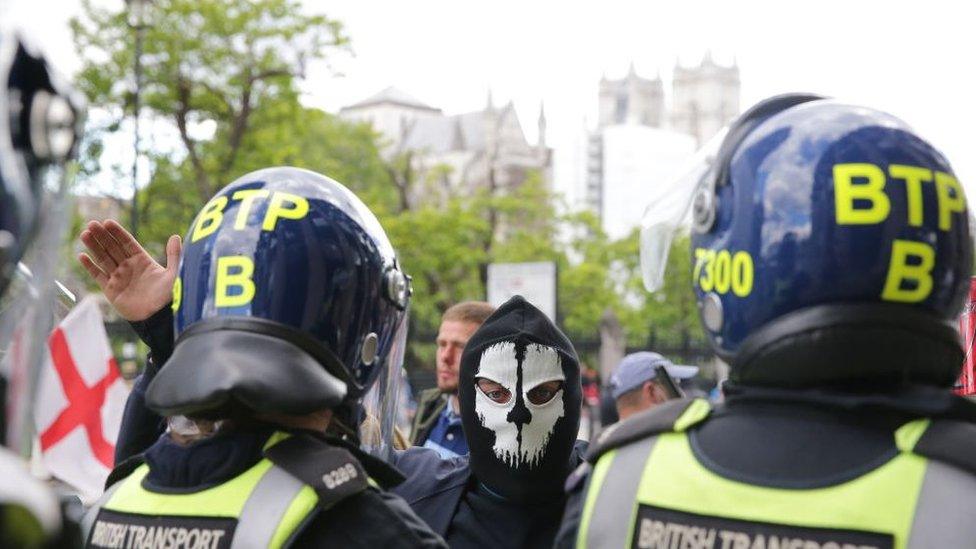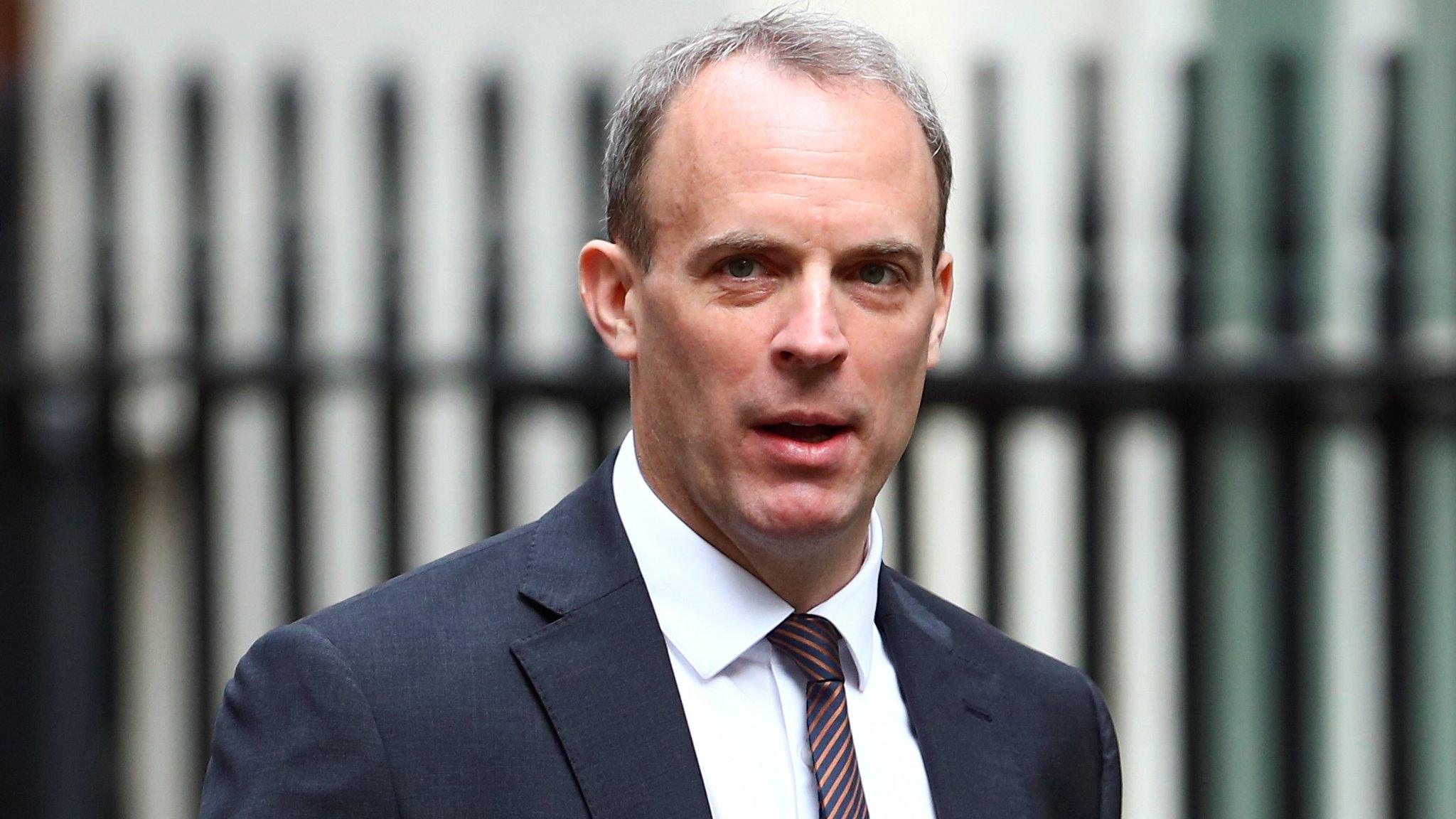Racism fuelling far-right threat in UK - MI5's Ken McCallum warns
- Published

Activists from far-right groups protested in London during Black Lives Matter demonstrations in 2020
The "toxic" issue of racism is fuelling a growing threat from the far right, the head of MI5 has warned.
Ken McCallum said MI5 was seeing teenagers as young as 13 drawn into extremist activity, often online.
But there was no sign of foreign states trying to sow divisions over race and the UK had to look closer to home to understand the problem, he said.
He also urged the public to be as vigilant about threats from "hostile states" as from terrorism.
Home-grown extremism
But he said MI5 was alert to the possible return of terrorist training camps in Afghanistan.
Giving an overview of of threats facing the UK, Mr McCallum said extreme right wing terrorism was "sadly here to stay", with 10 of 29 attack plots disrupted in the last fours years linked to it.
And it was a threat fuelled, in part, by racism, he said.
"Racism is a toxic issue that MI5 confronts every day, most visibly in our work to deal with extreme right-wing terrorism. Racism is not the sole and only fuel of that threat, but it is strongly there."
He said in the past there had sometimes been disinformation campaigns from states abroad seeking to drive wedges on issues such as race but this was not common. "We don't currently see particular bits of state-generated misinformation as being a major slice of the problem."
"If we were to find ourselves overly looking to blame abroad for this phenomenon of racism, we might risk not owning a portion of the problem that is ours within our own country," he added.
He said teenagers were a growing part of counter-terrorist case work, especially with the far right. This was most likely because of the strong online element of the problem, with the youngest person MI5 had come across aged 13.
MI5 has been focused primarily on Islamist-linked terrorism for the past 20 years since the attacks of 11 September 2001, launched by al-Qaeda from its base in Afghanistan.
And with Western troops now leaving Afghanistan, he acknowledged the potential danger of Islamist terrorist groups trying to rebuild their capabilities there.
"If pockets of ungoverned space open up, some terrorist groups might, for example, try to re-establish some training facilities there as we've seen in the past. It doesn't automatically follow that they would then build from there to try to direct terrorist attacks against the UK, for example, [but] that is clearly a possibility to which we must be alert," he said.
He said terrorists would be starting from a low base after 20 years of efforts against them but MI5 would now have to shift to a different mode of operation to deal with the threat, similar to the way it dealt with threats from Somalia.

Members of "The Base" far-right group have tried to groom teenagers in the UK
The MI5 chief also attacked Facebook and other tech companies for planning to roll out end-to-end encryption for some of its platforms, such as Messenger. This would make it impossible for the companies to hand over the content of users' messages to the authorities because they would no longer have access themselves.
"End-to end-encryption done in the way Facebook is currently proposing will hand a gift to the terrorists MI5 has to find and tackle - and a gift to the child abusers our colleagues in the National Crime Agency need to find and tackle," he said.
He said the tech companies had lived up to their responsibility to remove terrorist content from their platforms. But he said he wanted to make a public plea for them to engage seriously with governments - or him personally - to design in public safety alongside privacy in the future.
MI5 is doubling the amount of resources it is putting into countering the threats from hostile states, Mr McCallum revealed. These could include disruptive cyber-attacks, misinformation, espionage and interference in politics - and were usually linked to Russia, China and Iran.
He said these "less visible threats" had "the potential to affect us all" by impacting jobs and public services and could even lead to loss of life.
He said MI5 had disrupted plans since the Salisbury poisoning of 2018 which might possibly have involved attacking or killing individuals in the UK - but would not provide further details.
Football parallel
He confirmed reports that last autumn there had been an episode of Russian generated misinformation or disinformation in respect to the Oxford AstraZeneca coronavirus vaccine. Attempts to interfere in public life were increasing, he said, although they were not always successful.
He talked about the need for new legislation, which is currently being consulted on, to deal with such hostile state activity.
Mr McCallum also extended deepest sympathies to those who lost loved ones in terrorist attacks or state aggression and said MI5 was committed to learning any lessons necessary from events like the attack on Fishmongers' Hall and on the Manchester Arena.
Speaking at MI5 headquarters in Thames House, Mr McCallum also said he had cheered on the England football team - apart from for the 90 minutes when they played against Scotland - saying: "Even for a Scotsman, there was a great deal to like in this England team."
He said as he watched the penalty shoot-out on Sunday night he felt a parallel with his staff of "capable, brave young people of all races giving their all for the country". But he added: "You don't always win."

"THEY'RE NOT FANS, THEY'RE RACISTS": Football, Racism and Social Media
MAYANS MC: Blood runs thicker than water in the cartels between the US and Mexico

Related topics
- Published20 April 2021
- Published16 July 2020

- Published19 December 2017

- Published21 June 2021

- Published13 May 2017
